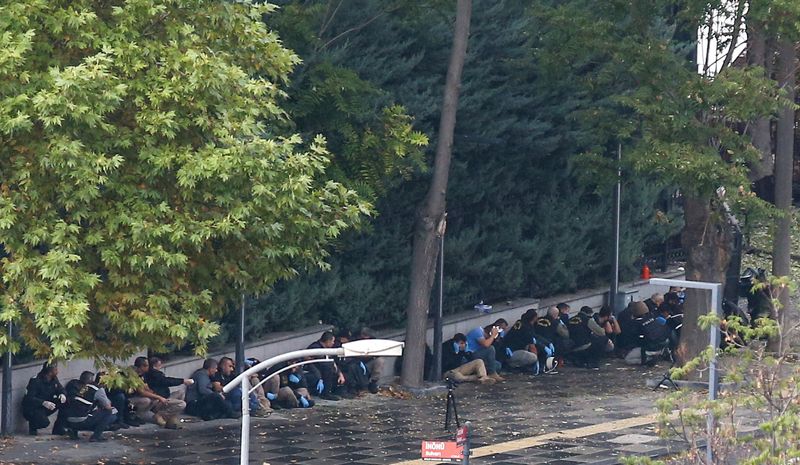By Huseyin Hayatsever and Burcu Karakas
ANKARA (Reuters) -Two attackers detonated a bomb in front of Turkish government buildings in Ankara on Sunday, leaving both of them dead and two police officers wounded, and a Kurdish militant group claimed responsibility for the attack.
Authorities called it the first terrorist attack in the capital in years.
CCTV footage obtained by Reuters showed a vehicle pulling up to the Interior Ministry's main gate and one of its occupants quickly walking toward the building before being engulfed in an explosion, while the other remains on the street.
The blast killed one of the attackers and authorities "neutralised", or killed, the other, the interior minister said of the incident that rattled a central district that is home to ministerial buildings and nearby parliament.
In a speech at the opening of a new parliamentary session hours later, President Tayyip Erdogan called the morning attack "the latest attempt" to inflict terror on Turks.
"Those who threaten the peace and security of citizens have not achieved their goals and never will," he said.
The ANF News website, which is close to the Kurdistan Workers Party (PKK) militant group, said a group called the 'Immortals Battalion' had carried out the attack, citing a PKK statement.
The statement described the bombing as a 'suicide attack' planned to coincide with the opening of parliament and carried out by "a team of ours linked to our Immortals Battalion".
The PKK is designated as a terrorist organisation by Turkey, the United States and the European Union. It launched an insurgency in southeast Turkey in 1984 and more than 40,000 people have been killed in the conflict.
The bomb on Ataturk Boulevard was the first in Ankara since 2016, when a spate of deadly attacks gripped the country. Video afterward showed a Renault (EPA:RENA) cargo vehicle parked there, windows shattered and doors open, amid debris and surrounded by soldiers, ambulances, fire trucks and armoured vehicles.
A senior Turkish official told Reuters the attackers had hijacked the vehicle and killed its driver in Kayseri, a city 260 km (161 miles) southeast of Ankara, before carrying out the attack. One of the injured officers suffered shrapnel injuries, he added.
"Two terrorists came with a light commercial vehicle in front of the entrance gate of the General Directorate of Security of our Ministry of Internal Affairs and carried out a bomb attack," Ali Yerlikaya, the interior minister, said on social media platform X.
He added the two officers were slightly injured in the incident at 9:30 a.m. (0630 GMT).
"Our struggle will continue until the last terrorist is neutralised," he said, echoing condemnation by other Turkish officials.
PAST ATTACKS
Police said they carried out controlled explosions for "suspicious package incidents" in other parts of Ankara.
Authorities did not identify any specific militant group.
The incident comes almost a year after six people were killed and 81 wounded in an explosion in a busy pedestrian street in central Istanbul. Turkey blamed Kurdish militants for that.
During a series of bloody incidents in 2015 and 2016, Kurdish militants, Islamic State and other groups either claimed or were blamed for several attacks in major Turkish cities. In March 2016, 37 people were killed in Ankara when a bomb-laden car exploded at a crowded central transport hub.
Ankara's chief prosecutor launched an investigation on Sunday into what it also called a terrorist attack.
Turkey's parliament is expected to consider ratifying Sweden's bid to join NATO in coming weeks, after Turkey had raised initial objections and delayed enlargement of the bloc.

Erdogan did not mention Sweden or NATO, but told members of parliament that agreeing a new constitution was a priority for the new session. The parliament speaker said its agenda would not surrender to terror.
Charles Michel, European Council president, said he strongly condemned what he called the terrorist attack, while EU Commissioner for Enlargement Oliver Varhelyi said it supports Turkey "in its fight against terrorism".
